Swami Vivekananda (1863-1902) was an Indian Hindu monk and a chief disciple of Ramakrishna.
Swami Vivekananda or Vivekanda may also refer to these, related to the monk, in India:
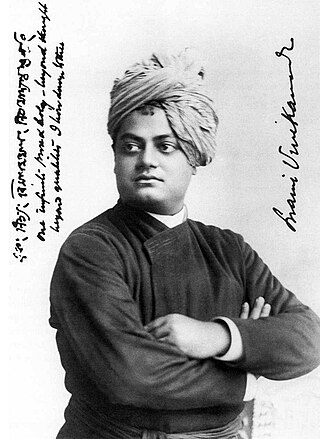
Swami Vivekananda, born Narendranath Datta, was an Indian Hindu monk, philosopher, author, religious teacher, and the chief disciple of the Indian mystic Ramakrishna. He was a key figure in the introduction of Vedanta and Yoga to the Western world, and the father of modern Indian nationalism who is credited with raising interfaith awareness and bringing Hinduism to the status of a major world religion.
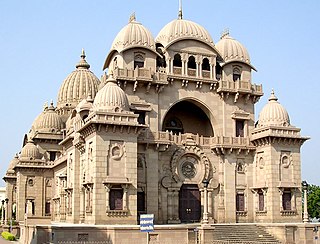
Ramakrishna Math is the administrative legal organization of the Ramakrishna Order, of Daśanāmi Sampradaya. It was set up by sanyasin disciples of Ramakrishna Paramhansa headed by Swami Vivekananda at Baranagar Math in Baranagar, a place near Calcutta, in 1886. India. The headquarters of Ramakrishna Math and its twin organisation, Ramakrishna Mission is at Belur Math.
Vivek is a masculine given name that is popular in South Asia, particularly in India and Nepal. It is of Sanskrit origin and means "wisdom" and/or "conscience".
Swamiji is a 2012 laser show and documentary film directed and produced by Manick Sorcar. Based on the life story of Hindu monk Swami Vivekananda (1863–1902), it is the first laser documentary made on an individual and the first full-length laser documentary ever to be shown in a performing arts center.

Advaita Ashrama, Mayavati, is a branch of the Ramakrishna Math, founded on 19 March 1899 at the behest of Vivekananda, by his disciples James Henry Sevier, and Charlotte Sevier. Today it publishes the original writings of Vivekananda. As an ashram dedicated to the study and practice of Advaita Vedanta, no images or idols are worshipped there, not even of Ramakrishna; and no images were kept in the premises according to the Ashram ideals set by Vivekananda.
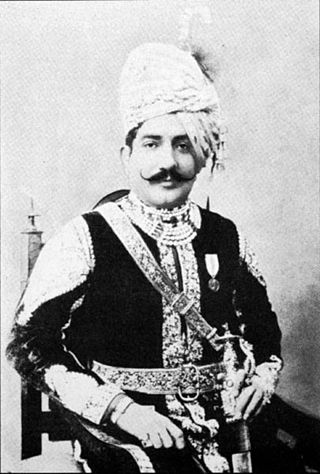
Raja Ajit Singh Bahadur was the ruler of the Shekhawat estate (thikana) of Khetri at Panchpana in Rajasthan between 1870 and 1901. He was born on 16 October 1861 at Alsisar. His father was Thakur Chattu Singh, a resident of Alsisar. Ajit Singh was later adopted to Khetri and after the death of Fateh Singh, he became the eighth king of Khetri in 1870. In 1876, he married Rani Champawatiji Sahiba and the couple had one son and two daughters. He died on 18 January 1901 due to an accident at the tomb of Akbar in Sikandra near Agra and was cremated at Mathura.

Swami Vivekananda is a 1998 Indian biographical film directed by G. V. Iyer and produced by T. Subbarami Reddy. It took Iyer 11 years to finish the research work required for the film and to write the screenplay.
SETU may refer to:
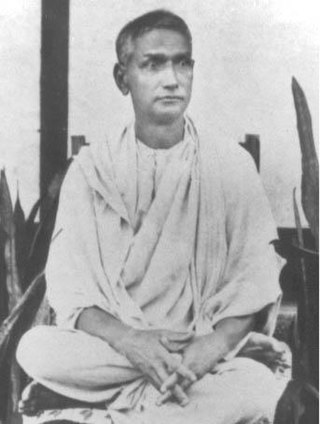
Nirmalananda, born as Tulasi Charan Dutta in Calcutta, was a direct disciple of Ramakrishna, the 19th-century mystic and Hindu saint from India, and took Sanyasa from Vivekananda along with Brahmananda and others. He was initiated by Sri Ramakrishna, on which fact a few latter-day antagonists tried to cast doubt in the Bangalore Court, but into which question the Court refused to get into. Nirmalananda played a key role in establishing Ramakrishna Math and Mission chiefly in South India, in Kerala and Bangalore and Tamil Nadu and also in the USA, Burma and Bangladesh.
Narendra may refer to:

Josephine MacLeod was an American friend and devotee of Swami Vivekananda. She had a strong attachment to India and was an active participant in the Ramakrishna Vivekananda movement. She was given the nicknames "Tantine" and "Jo Jo" by Vivekananda. She considered Swami Vivekananda to be her friend and helped him with his finances. MacLeod was not a sanyasin, unlike many others such as Sister Nivedita or Sister Christine. She was instrumental in spreading Vivekananda's message on Vedanta in the West. She made many contributions to the initial and the later phases of the development of the order of Ramakrishna and Vivekananda. She was a contributor to many causes espoused by Sister Nivedita, the most famous disciple of Vivekananda, including that of contributing financially towards the development of the Indian National Movement especially in Bengal and elsewhere in India.

Swami Vivekananda was an Indian Hindu monk. He was a key figure in the introduction of the Indian philosophies of Vedanta and Yoga to the western world. The 150th birth anniversary of Swami Vivekananda was celebrated all over India and in different countries in the world. Ministry of Youth Affairs & Sports of India decided to observe 2013 as the year of 150th Birth Anniversary of Swami Vivekananda. Year-long events and programs were organised by different branches of Ramakrishna Math, Ramakrishna Mission, central government and different state governments of India, education institutions, youth groups etc. Bengali film director Tutu (Utpal) Sinha made a film The Light: Swami Vivekananda as a tribute to Swami Vivekananda on his 150th birth anniversary. The movie was released on 23 August 2013.
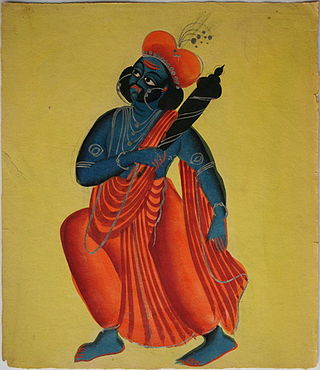
"Arise awake and stop not till the goal is reached." is a slogan popularized in the late 19th century by Indian Hindu monk Swami Vivekananda, who took inspiration in a sloka of Katha Upanishad. It was his message to the world to get out of their hypnotized state of mind. This shloka is the basis of the title of the book The Razor's Edge and the 1946 film and the 1984 film, and also of various music albums in the west by bands like AC/DC, Dave Holland, etc.

Bartaman Bharat is a Bengali language essay written by Indian Hindu monk Swami Vivekananda. The essay was first published in the March 1899 issue of Udbodhan, the only Bengali language magazine of Ramakrishna Math and Ramakrishna Mission. The essay was published as a book in 1905, and later it was compiled into the fourth volume of The Complete Works of Swami Vivekananda.
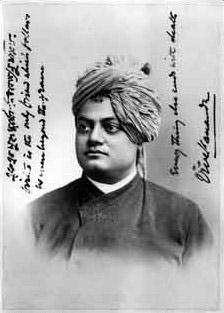
"Buddhism, the Fulfilment of Hinduism" is a lecture delivered by Indian Hindu monk and expounder Swami Vivekananda on 26 September 1893 at the Parliament of the World's Religions in Chicago. In this lecture, he expressed his opinion that "Buddhism was the fulfilment of Hinduism."

Swami Vivekananda, the nineteenth-century Indian Hindu monk, is considered one of the most influential people of modern India and Hinduism. Rabindranath Tagore suggested to study Vivekananda's works to learn about India. Indian independence activist Subhas Chandra Bose regarded Vivekananda as his spiritual teacher. Mahatma Gandhi said that after reading the works of Vivekananda, his love for his nation became a thousand-fold.
Swami Vivekananda Road may refer to the following places in India:
Swami Vivekananda University may refer to—
Swamiji, swami-ji, or swami ji is a variant of swami that is used as a direct form of address toward, or as a stand-in for the name of, a Hindu religious leader.
Vivekanandan is an Indian name that is mostly used in South India as a variant of the name Vivekananda. The name originates from two Sanskrit-based words Vivekam meaning wisdom or knowledge and Anandam meaning joy; therefore, the name Vivekanandan denotes a person who finds joy in wisdom or knowledge.